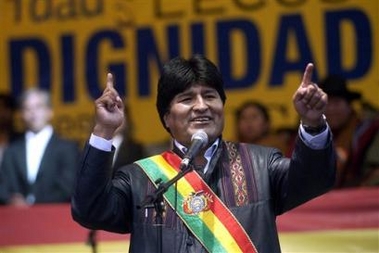|
Morales becomes Bolivia's first Indian president
(Reuters)
Updated: 2006-01-23 09:18
Leftist coca grower leader Evo Morales was sworn in on Sunday as the first
indigenous president of Bolivia with high expectations of a better life for the
poor majority in one of Latin America's most volatile countries.
The latest in a string of leftists to sweep to power in the region in a
backlash against U.S.-backed free-market policies, Morales won 54 percent of the
vote on December 18, the biggest landslide since the return to democracy in
1982.
An Aymara Indian who herded llamas as a boy, Morales cried as he donned the
presidential sash and medal over his black wool jacket embroidered with
traditional colored stripes while an unprecedented 12 heads of state looked on.

New Bolivian President Evo Morales speaks to
supporters at the Plaza de los Heroes square in La Paz, Bolivia on Sunday,
Jan. 22, 2006.[AP] | "The 500 years of Indian
resistance have not been in vain," Morales said in his inaugural speech. "From
500 years of resistance we pass to another 500 years in power."
Miners and Indians with weathered faces, many clad in the colorful clothing
of the Andean highlands, swarmed the colonial government square chanting "Evo,
Evo" and waving the indigenous rainbow-hued flag, the Wiphala.
Bolivia's rich and poor hope the historic hand-over will bring stability
after street protests toppled the two previous presidents and dozens died in
clashes with security forces.
But Morales' leftist and pro-coca rhetoric has unsettled Washington, a highly
influential presence in Bolivia as the top aid donor and sponsor of a coca
eradication program. In closing his election campaign, he said his Movement to
Socialism party was "a nightmare for the United States."
His biggest supporters along the way have been Cuban President Fidel Castro
and Venezuelan leader Hugo Chavez, united by their opposition to U.S. presence
in the region.
In his inaugural speech, Morales blamed the "neo-liberal" economic policies
of the past and the "looting of our natural resources" for the poverty that
affects around two-thirds of Bolivians.
"We have a lot of faith that he can help us because he is a poor man like
us," said Teofira Marca Sajama, an Indian woman from Morales' home province of
Oruro clad in a bowler hat, flouncy skirt and bright green shawl.
|